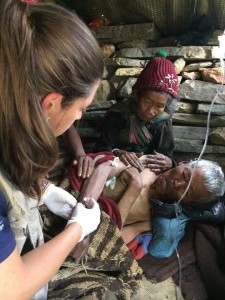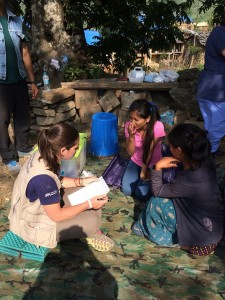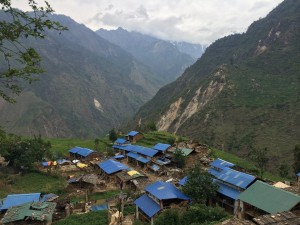The daily aftershocks continue here in Nepal, though so frequently that, at times, I wonder if I am only imagining the ground moving beneath my feet. Regardless, our mobile medical units continue to fly into logistically challenging, but extraordinarily stunning mountain villages to provide post-earthquake assistance- only coming back to base long enough to reload supplies, hand wash some laundry and identify the next destination.
Recently, we flew into a village named Tipling. Similar to many other mountain villages, Tipling is cut into the side of a mountain with stunning snow-capped mountain views. Almost every destination in Tipling requires a steep uphill hike, which is made somewhat more difficult being at an altitude of about 6,000 feet. One of the first places I had to visit in Tipling was the health post. There we hoped to speak with the health workers and discover whether or not the health post survived the earthquakes. Being about a thirty-minute hike from where we landed, a local man volunteered to serve as our guide. As we hiked, he began telling us about Tipling and stories of those who died and those who survived the earthquakes.
About halfway through the hike, he stopped and pointed out a landslide on a neighboring mountain. As we caught our breath, he began telling us the story of a man who worked in the city for years to earn enough money to build a home for his family- his property being the land right beneath that landslide. Shortly before the first earthquake, he finished building his dream home. When the earthquake hit, it triggered the landslide, which demolished his home, killed his livestock and buried a friend who was looking after his livestock as they grazed on the mountainside. He was able to unearth his friend and carried him to the nearest health post- where his friend died shortly afterwards. Nothing but loose dirt and stone can be seen where that home once stood.
During our time in Tipling, the medical team treated a couple hundred patients, two of which were bitten by a dog and needed the Rabies immunoglobulin and vaccine. Because reception in these villages is inconsistent even with a satellite phone, a physician and I hiked up further to get better reception to organize a helicopter supply drop of the needed Rabies medications. We took a different path on the way down and came across a small hut covered by a bright orange tarp. Inside was an elderly woman sitting next to an obviously sick elderly man. The woman poked her wrinkled and weatherworn face out of the hut and eagerly motioned for us to enter as we passed. The man was lying on a wooden slab and was barely conscious with a weak pulse, high fever and uneven respirations. The physician stayed by his bedside while I ran back to the clinic and collected some supplies and medications. We did what we could for him, though we knew there was a very good chance he would not survive the day. Every hour- for the rest of the day- the physician or I would hike back up to the hut to check on him and administer more medications as needed. By the evening, he was able to open his eyes and smile at us. By the next day, he was sitting up on his makeshift bed enthusiastically waving whenever he saw us coming up the path. He survived, but he is only one of many that have or will succumb to illness due to living in inadequate shelters with the rains, winds and nightly cold in the upper mountain regions.
In Tipling, the tiered mountainside crops look healthy, but the shaking of the earth caused many of the roots to break away. As a result, many of the plants are rotting from the ground up. As we closed clinic on our final day, a steady stream of villagers began walking into our campsite. Despite their losses, each one carried with them a gift of potatoes, eggs, onions or beans. With an enthusiastic smile, each person came forward, placed their gift in our hands and bowed respectfully to the medical team. It was such a costly gift of gratitude and it was given so graciously. The kindness, friendship, and respect we have been shown have been overwhelming. I hope I am able to give as much as I have been given.
As I lay in my tent late that night, trying to negotiate a truce between my ribs and the stones beneath my tent for the millionth time and contemplating the day’s events, a goat found its way into our campsite. By the rummaging noise, I knew the goat had found our trash bag. The trash needed to be moved, but the nights are so cold in the upper mountain villages that it didn’t take long to decide staying in my sleeping bag was the best idea. Just as I made that decision, I heard the goat take off running with the trash. After all of the kindness the village had shown us, I couldn’t let one of their goats die of garbage consumption. I found my headlamp, whipped open my tent, threw on my shoes and took off after the goat. The goat ran through the village and my plaid pajamas and I ran after the trail of trash it left behind. Eventually I found the goat. It dropped the bag as soon as it saw me and took off down an alleyway- as if it knew it was guilty of some misdeed. After picking up all of the trash, I finally climbed back in bed- happy there are no bears and happy I was able to save both a man and a goat all in one day.
I hope you are all well! Thank you for all of the thoughts, prayers and letters- I love hearing from home.



